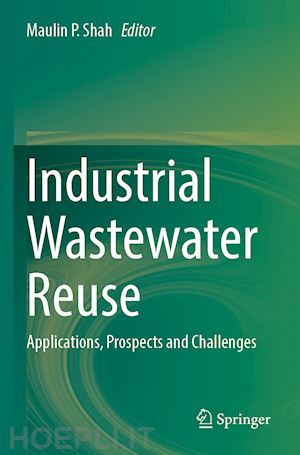

Questo prodotto usufruisce delle SPEDIZIONI GRATIS
selezionando l'opzione Corriere Veloce in fase di ordine.
Pagabile anche con Carta della cultura giovani e del merito, 18App Bonus Cultura e Carta del Docente
The application of sustainable technologies can eliminate or minimize micro-contaminants in wastewater. Several organizations focus on the potential impacts to humans and their environments by wastewater reuse. This book gathers new research and reviews work from researchers and scientists to identify the main barriers and limitations that will need to be overcome, so that wastewater reuse strategies gain more momentum and will be adopted more efficiently worldwide.
The book is designed for engineers, scientists, and other professionals who are seeking an excellent introduction to and basic knowledge of the principles of environmental bioremediation technologies.- Constructed Wetlands and Vermifiltration two successful alternatives of wastewater reuse: A commentary on development of these alternate strategies of wastewater treatment.- Treatment of metallurgical wastewater by a combination of zero valent iron and coagulation technology.- Valorization of sugarcane vinasse for fungal biomass protein production: Potential application as fish feed ingredient.- Emerging contaminants in wastewater: Eco-toxicity and sustainability assessment.- Membrane and disinfection technologies for industrial wastewater treatment.- Holistic approach to remediate heavy metals and radionuclides.- The Role of Nanotechnology in Bioremediation of Pollutants.- Nanobiotechnology: A Sustainable Approach for Marine Environment Bioremediation.- Cell immobilization for the fungal bioremediation of wastewater contaminated with heavy metals.- Waste Water Treatment Technologies.- Genetically Modified Microbe Mediated Metal Bioaccumulation: A Sustainable Effluent Treatment Strategy.- Nanobioremediation: Ecofriendly Approach In Pollutants Removal.- Bioremediation of Soils Polluted with Hexavalent Chromium using Bacteria.- New Bioremediation Technologies to Remove Heavy Metals and Radionuclides.- Water reuse planning, policy, monitoring requirements, and standards/criteria.- Wastewater Treatment and Reuse in Future Cities.- Inorganic nitrogen and phosphate removal from port water using microalgal biotechnology towards sustainable development.- Bioremediation of organic and heavy metal co-contaminated environments.- Algal microbial symbiotic system-From a biological process to biorefinery.- Emphasizes the role of nanotechnology in bioremediation of pollutants.- Treatment of trace organics and emerging contaminants using traditional and advanced technologies.











Il sito utilizza cookie ed altri strumenti di tracciamento che raccolgono informazioni dal dispositivo dell’utente. Oltre ai cookie tecnici ed analitici aggregati, strettamente necessari per il funzionamento di questo sito web, previo consenso dell’utente possono essere installati cookie di profilazione e marketing e cookie dei social media. Cliccando su “Accetto tutti i cookie” saranno attivate tutte le categorie di cookie. Per accettare solo deterninate categorie di cookie, cliccare invece su “Impostazioni cookie”. Chiudendo il banner o continuando a navigare saranno installati solo cookie tecnici. Per maggiori dettagli, consultare la Cookie Policy.